The best fitness trackers are a terrific way to encourage yourself to be active, keep you accountable when you've set yourself goals, and can give you an idea of how much activity you get each day. But it isn't just adults who stand to benefit from being active – the best fitness trackers for kids can offer similar benefits. Well-established brands such as Garmin and Fitbit offer fitness trackers that are ideal to help encourage healthy habits in children.
Best fitness trackers for kids at a glance
• Best overall: Fitbit Ace 3 – View on Argos
• Best budget: Biggerfive Vigor 2 – View on Amazon
• Best premium fitness tracker for older kids: Garmin Vivosmart 5 – View on John Lewis
• Best kids' fitness tracking smartwatch: Apple Watch SE (2nd gen) – View on Amazon
• Best Garmin fitness tracker for younger kids: Garmin vivofit Jr.3 – View on Amazon
There's plenty of evidence showing the importance of exercise for children and young people. Studies have linked being physically active to improved fitness, better cognitive function and lower risk of obesity and associated health risks.
The NHS recommends that children and young people 5-18 years old should be aiming for at least 60 minutes of physical activity per day. A fitness tracker can help ensure young people aren’t missing the valuable health benefits of being fit and active.
Here's our selection of the best fitness trackers for kids, whatever their age.
The best fitness trackers for kids in 2024
Please note: All prices are correct at the time of writing. Prices, stock and deals are subject to change without notice.
1.
Fitbit Ace 3
Best overall
 Fitbit
FitbitThe Fitbit Ace 3 tops our list of the best fitness trackers for kids, because it provides the key metrics to help children keep track of their activity levels. It offers step counting, sleep tracking, and time spent being active. It also features reminders to get moving if they’ve been spending too long on the sofa, and rewards, avatars and clock faces for being active.
The Ace 3 is suitable for children from the age of six, and the companion Fitbit app allows parents to keep track of their children’s data. It doesn’t have as many health and fitness tracking features as many Fitbits. For younger children, this is potentially a good thing, as it means that stats such as estimated calorie burn, heart rate, and other metrics won’t be available. For older teenagers, this might be a bit limiting, if they want more insights into their health and fitness.
The design is relatively understated, making it great for younger children, but as they get older, it won’t be too babyish in appearance. The silicone strap is also interchangeable, giving some customisation options. It’s also designed to provide the screen with protection from bumps. It’s a good, basic fitness tracker that’s great for encouraging young children to get active. And it’s not too pricey either, with an RRP of £69.99, but often on sale for under £50.
Pros
- Silicone strap is comfortable, durable, and protects the screen
- Waterproof design means it's fine to go swimming
Cons
- No GPS
| Display | 0.72-inch, PMOLED |
| Battery life | Up to 8 days |
| Connections | Bluetooth |
| Compatibility | Compatible with iOS 12.2 or higher & Android OS 7.0 or higher. |
| Dimensions | 37.39 x 16.8 x 12.9 mm |
| Weight | 20 grams |
Best budget
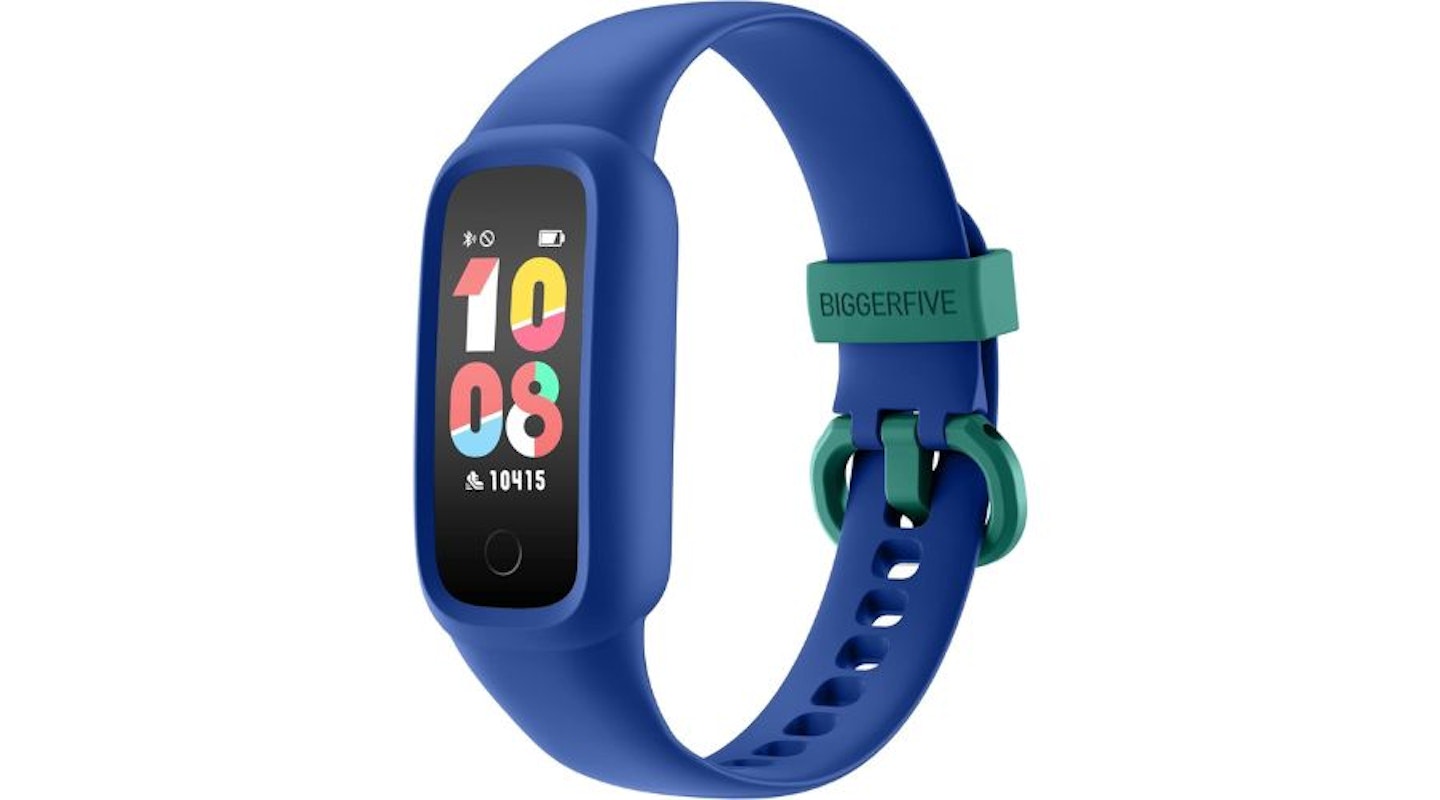 Biggerfive
BiggerfiveIf you’re looking for something more affordable - perhaps for younger children who aren’t renowned for their ability to look after things – then the Vigor 2 kids’ fitness tracker ticks a lot of boxes. Costing less than £30, it’s by far the cheapest fitness tracker on our list, but it still has the essentials you would expect to find.
Offering step counting, distance covered and estimating calorie burn, the Vigor 2 also supports more than ten different activity types – including walking, running, cycling, football, and more. It’s also IP68 waterproof rated, meaning your kid can take it for a dip in the pool without worrying. It also offers heart rate and sleep tracking, making this a comprehensive tracker, especially at this price point.
It isn’t perfect; as you may expect for something so inexpensive, it isn’t as accurate as some more advanced devices, and the display isn’t great. The fact it counts calories may also be offputting for some. This is a device that’s probably best suited to help get your children interested in tracking their health and fitness, and when they’re ready, perhaps upgrading to one of the best fitness trackers under £50.
Pros
- User friendly
- Comfortable to wear
Cons
- Not as accurate as the best fitness trackers
- Calorie estimates may be unsuitable for younger children
| Display | 0.96-inch |
| Battery life | Up to seven days |
| Connections | Bluetooth |
| Compatibility | Android 6.0 and above, iOS 9 and above |
| Dimensions | 21 x 15 x 10 mm |
| Weight | 91 grams |
Best premium tracker for older kids
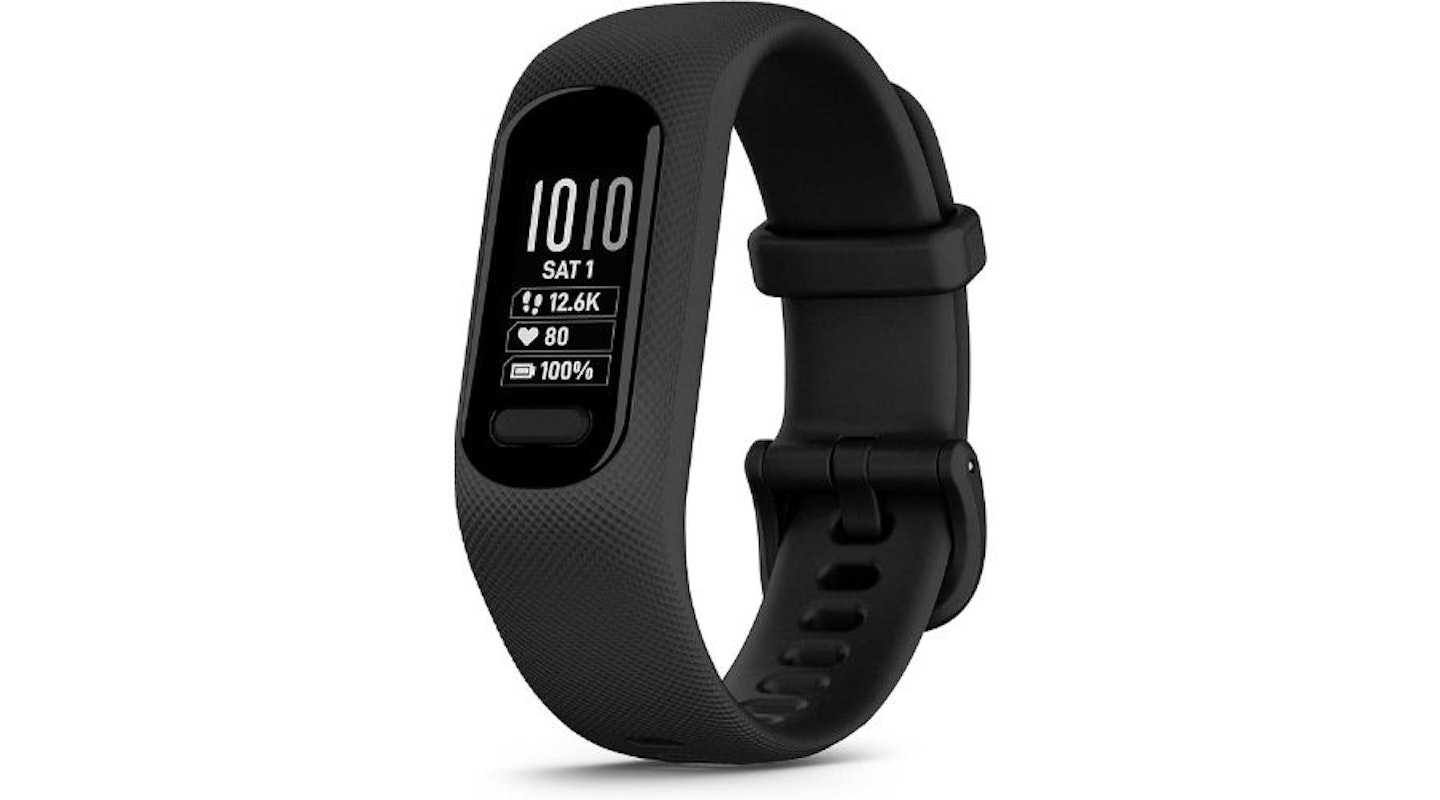 Garmin
GarminWe’re big fans of Garmin smartwatches and fitness trackers. So, if you’re looking for a fitness tracker that offers more advanced metrics, an excellent supporting app, and accurate tracking, the Garmin Vivosmart 5 is a great choice.
We’d say this one would be less suitable for young children, but could be ideal for teenagers, especially if they are involved in competitive sports. Offering heart rate, blood oxygen, sleep, estimated calorie burn and stress monitoring, this is one of the most comprehensive fitness trackers on our shortlist. Garmin Connect is one of the best companion apps around, presenting data clearly. It also has the excellent Body Battery feature, which offers insights into whether your body is ready for another intense day of activity, or if something more restful might be in order. The Vivosmart 5 also tracks a variety of different workout types, including running, cycling and swimming, among others.
While the RRP is £129.99, the Vivosmart 5 has been around since 2022, so it’s sometimes available for under £100. It doesn’t have built-in GPS, which is a slight negative, as it means you’ll need a phone to accurately track runs or bike rides. The comprehensive data tracking and lack of parental controls mean this won’t be suitable for every child. But it has almost everything a serious young athlete might want, to help them reach their fitness goals.
Pros
- Very accurate activity tracking
- The Garmin Connect app presents data superbly
- Solid battery life
Cons
- Black and white screen is disappointing
- Price is high compared to alternatives
| Display | 0.41 x 0.73-inch AMOLED |
| Battery life | Up to seven days |
| Connections | Bluetooth |
| Compatibility | Android and iOS |
| Dimensions | 19.5 x 10.7 x 217 mm (small), 19.5 x 10.7 x 255 mm (large) |
| Weight | 24.5 grams (small), 26.5 grams (large) |
Best smartwatch
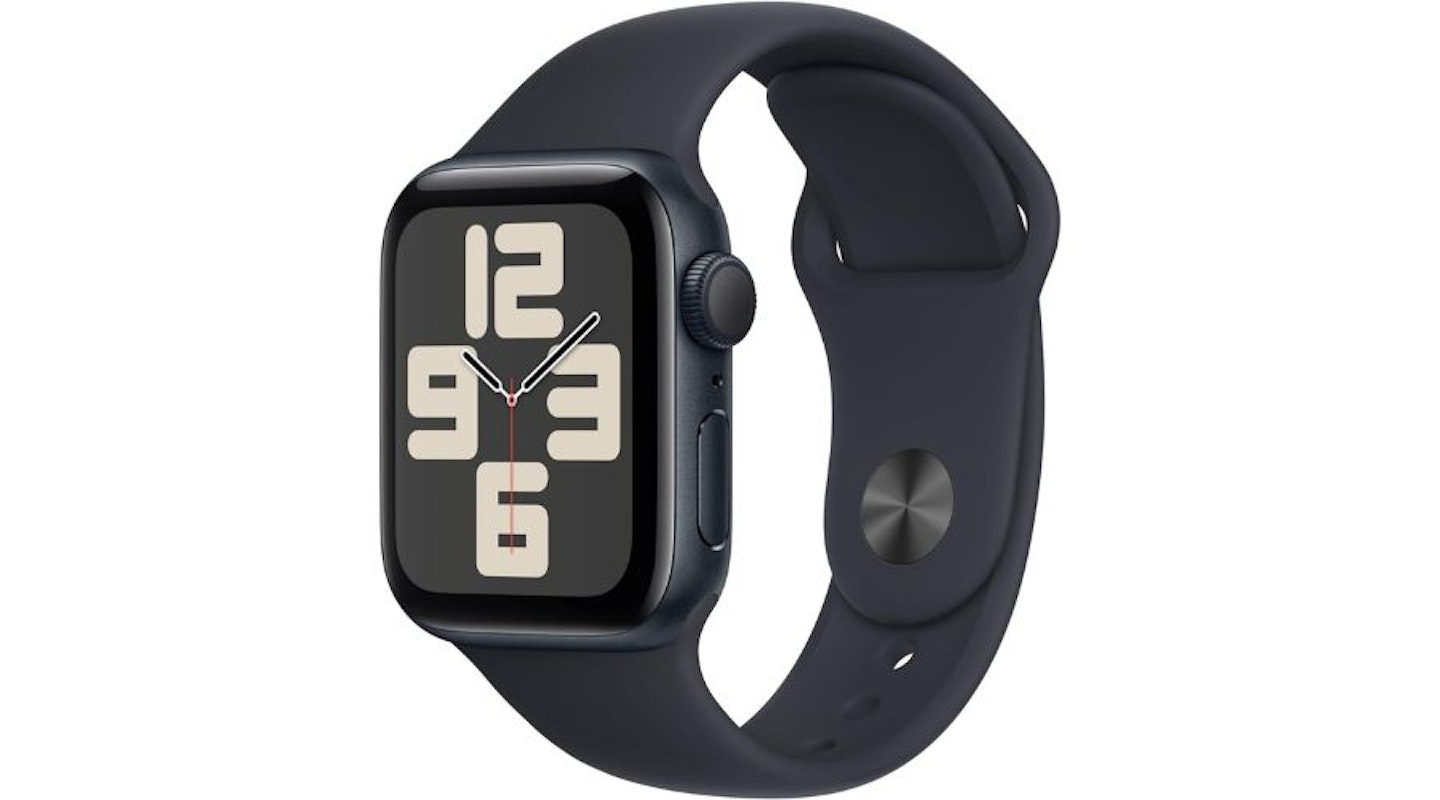 Apple
AppleThe Apple Watch SE is the priciest device on this shortlist, with an RRP starting from £219. And it’s not a device that is designed specifically with kids in mind. But, if you are looking for a more complete smartwatch experience than you’ll get from a dedicated fitness tracker, and still have an element of parental control over its features, the Apple Watch SE is as good as it gets.
The Apple Watch SE offers a full smartwatch experience, meaning it can be used for apps, music, sending text messages, and making phone calls, for example. Its built-in GPS means that as well as being able to accurately track outdoor activity, a parent can also track the whereabouts of the watch and their child, using the Find My app.
Crucially in a shortlist for kids' fitness trackers, your child doesn’t need a smartphone of their own to use an Apple Watch. It can be set up on a parent’s iPhone using Family Setup. This also allows you to adjust features and settings to make sure it’s age appropriate. For example, the activity app can be tweaked to display minutes spent moving, rather than active calories burned.
Battery life on Apple Watches isn’t the best – you'll almost certainly need to charge this daily. But you won’t find a more polished smartwatch experience anywhere else.
Pros
- Beautiful OLED display
- Highly-polished full smartwatch experience
- Family Setup gives parents some control over functionality
Cons
- Battery life is disappointing
- Only compatible with iPhone
| Display | 1.57-inch OLED |
| Battery life | Around 18 hours |
| Connections | Bluetooth, GPS |
| Compatibility | iOS only |
| Dimensions | 40 x 34 x 10.7 mm (40 mm model) / 44 x 38 x 10.7 mm (44 mm model) |
| Weight | 27.8 grams (40 mm model), 33 grams (44 mm model) |
Best Garmin fitness tracker for younger kids
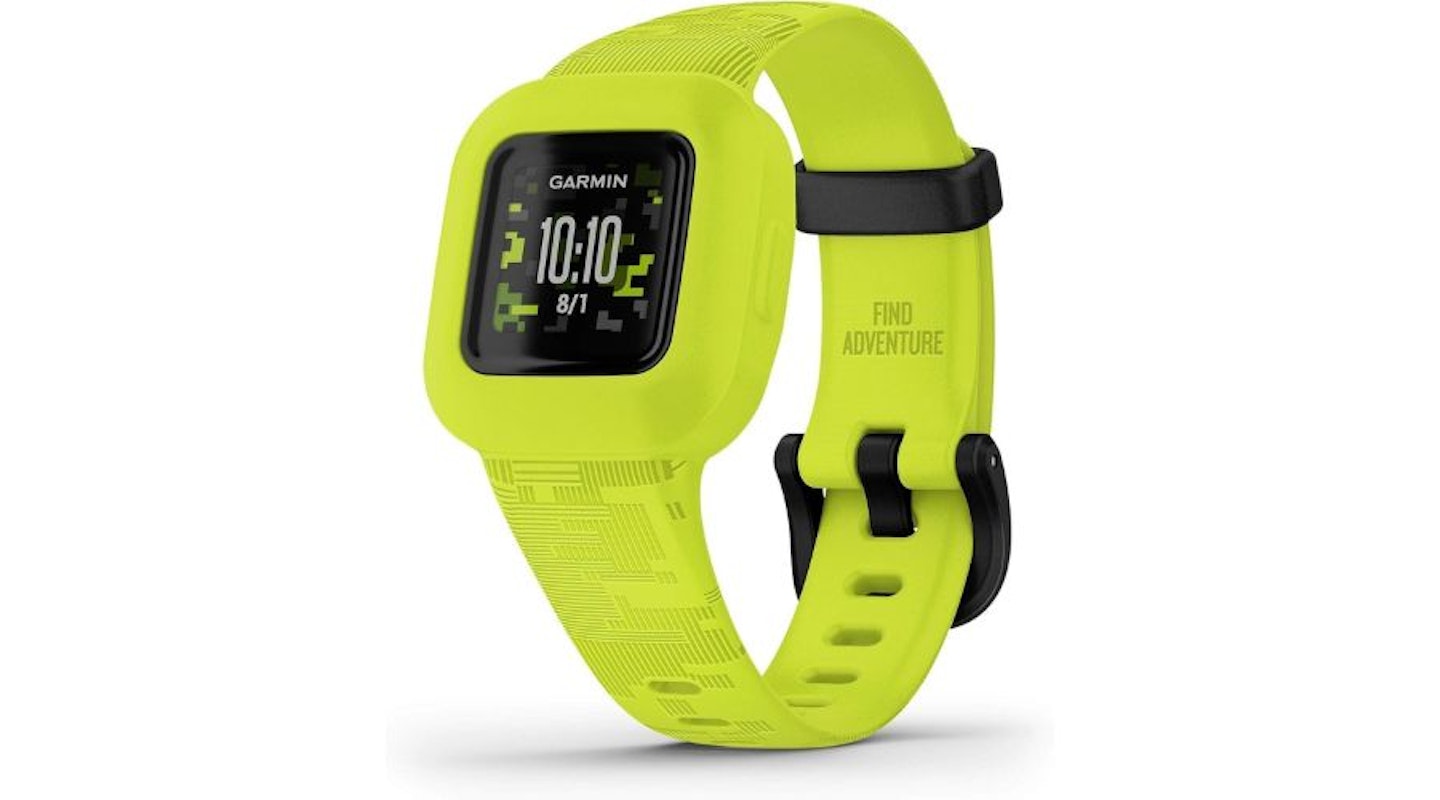 Garmin
GarminGarmin’s Vivofit Jr. 3 will appeal to younger kids – especially if they like Marvel, Star Wars, or Disney princesses – all of which are available as themes. It offers some basic fitness tracking features, including step counting, a 60-minute activity goal tracker, and timed activities.
There are also challenges and rewards to keep younger children engaged – such as adventures and games that are unlocked as children spend more time being active. The Vivofit Jr. 3 also provides fitness cards, which show basic exercise moves for children to learn, such as jumping jacks, mountain climbers, and downward dog. The battery also lasts for up to a year, so you won’t need to worry about regularly charging it. Finally, the Garmin Jr. app allows parents to assign chores, set reminders for their kids, and keep track of their activity levels.
The designs mean this device is more likely to appeal to younger children than teenagers, who might feel that it’s a bit too childish. It’s also a lot more basic than the Vivosmart 5 we highlighted earlier. But we’re huge fans of Garmin when it comes to fitness trackers, which are typically some of the most accurate on the market.
Pros
- Star Wars, Marvel and Disney characters will appeal to young fans
- Lots of games and rewards to encourage activity
- One year battery life
Cons
- May lose its appeal as children grow up
| Display | 14.11 x 14.11 mm |
| Battery life | Up to one year |
| Connections | Bluetooth |
| Compatibility | iPhone and Android |
| Dimensions | 210 x 13 x 21 mm |
| Weight | 25 grams |
Best hybrid fitness tracker for kids
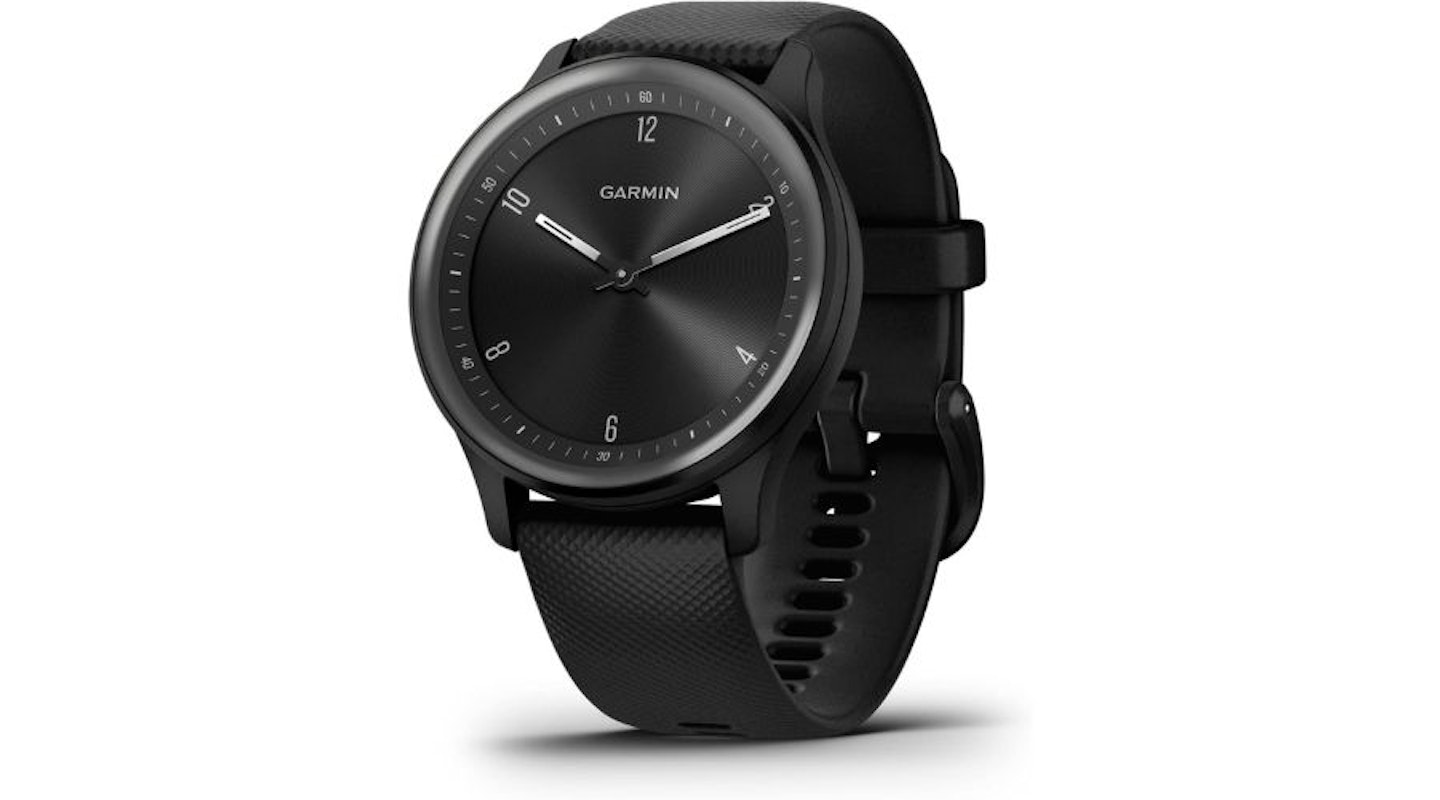 Garmin
GarminIf you want to combine the aesthetics of a traditional analogue watch with the smarts of a fitness tracker, then the Gamin Vivomove Sport is a great option. The analogue watch face makes this look like a traditional watch, but it has a hidden touchscreen display, and can track plenty of health and fitness metrics as well.
Because it’s a Garmin, it has loads of tools to help your kids stay on top of their fitness – metrics include body battery, sleep, heart rate, menstrual cycle and respiration tracking. The watch also tracks steps, calories, yoga, swimming, strength training and cardio activity. All of this is presented in the excellent Garmin Connect app, which is comprehensive and easy to use.
With an RRP of £179.99, it’s one of the pricier options on our list. For younger children, this will almost certainly be overkill, offering loads of features that simply aren’t necessary. For teenagers, for whom design is a factor, this represents a brilliant combination of style and substance.
Pros
- Stylish analogue design
- Garmin Connect supporting app is excellent
- Lots of health and fitness tracking metrics
Cons
- Pricey compared to alternatives
- Number of features may be unnecessary for some kids
| Display | 0.34 x 0.73-inch OLED, 72 x 154 pixels |
| Battery life | Up to 5 days |
| Connections | Bluetooth |
| Compatibility | iOS and Android |
| Dimensions | 40 x 40 x 11.0 mm |
| Weight | 33.8 grams |
Best Fitbit for older kids
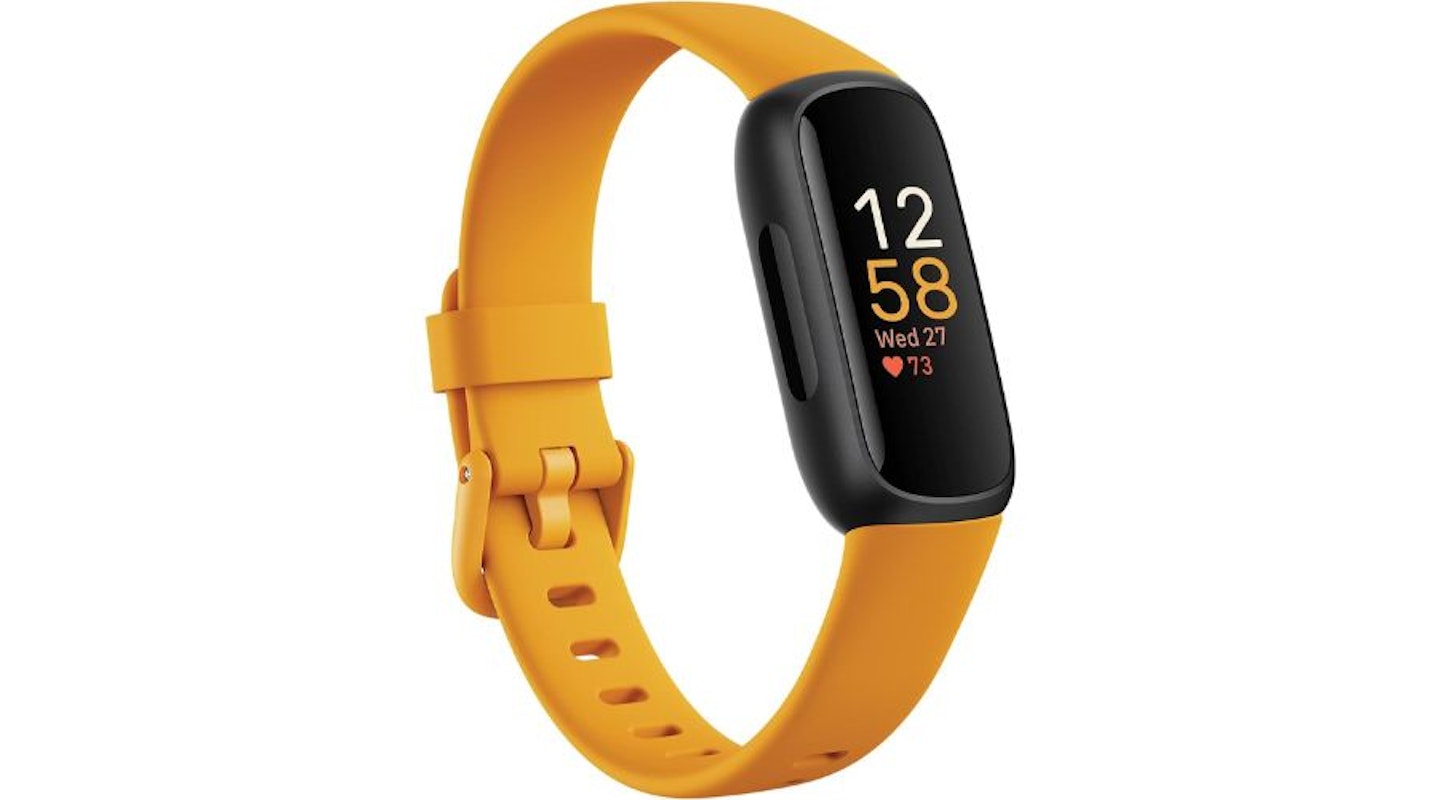 Fitbit
FitbitAs one of the best fitness trackers under £100, the Fitbit Inspire 3 is another polished device that will likely appeal to older kids and teenagers. It doesn’t have quite as many features as the newer (and considerably more expensive) Fitbit Charge 6, but as one of Fitbit’s smallest and most affordable fitness trackers, it still manages to pack plenty in.
Heart rate, sleep, blood oxygen levels and estimated calorie burn are all available, as well as plenty of exercise modes to track common types of activity including walking, running and cycling. It’s also water resistant for swimming, and with the Fitbit app, users can access added insights like their Cardio Fitness Score and Daily Readiness Score (like Garmin’s Body Battery).
On the downside, if you want access to all the features it offers – such as Daily Readiness Score and all your sleep insights - you’ll need to pay an extra £7.99 a month for Fitbit Premium. The Premium plan does offer extra workouts and nutrition guides, but for many kids, this won’t be of much use.
Pros
- Excellent 10-day battery life
- Lightweight and comfortable
- Tracks lots of health and fitness metrics
Cons
- Some insights only available with Fitbit Premium
- Small screen can be fiddly to use
| Display | 1.4 inches |
| Battery life | Up to 10 days |
| Connections | Bluetooth |
| Compatibility | Apple iOS 15 or higher, Android OS 10 or higher. |
| Dimensions | 39.32 x 18.6 x 11.75 mm |
| Weight | 20 grams |
Best fitness tracker for kids with smart features
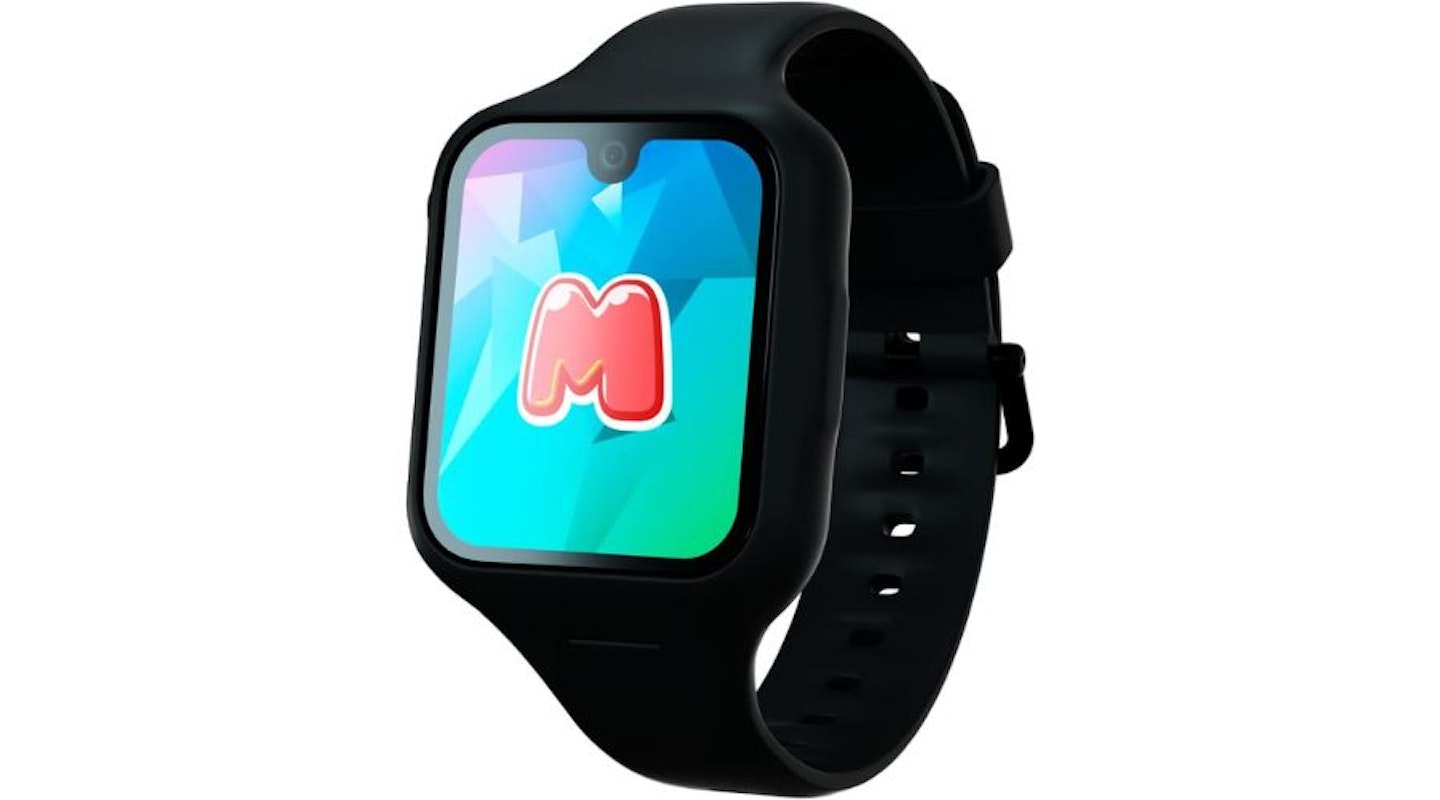 Moochies
MoochiesThe Australian brand behind the Moochies Odyssey promotes this as a “phone watch” rather than a fitness tracker. It gives children an introduction to smart devices while keeping a close eye on safety. Unlike other devices on our list, this one requires a monthly SIM subscription (either £12.50 or £17.50 every 28 days).
In return, kids can use the watch to make and receive calls from a list of safe contacts set via the companion app. It can also send texts and photos, and an SOS mode allows the wearer to press a button and instantly send a live GPS location to everyone on the safe contact list. There’s even a Class Mode to stop the watch from causing any distractions during lessons. Oh, and there’s no social media access, either.
In fitness terms, the inbuilt step tracker lets kids get an idea of how active they’ve been on any given day, while an IP68 waterproof rating means this watch can cope with getting wet. It’s less comprehensive than other devices in fitness terms – but it’s a clever introduction to smart devices, without compromising on safety.
Pros
- Excellent safety features for parents
- OLED display
- Class Mode to prevent distractions at school
Cons
- Monthly subscription could get quite pricey over time
- Limited fitness features
| Display | 1.78-inch OLED, 368 x 448 px |
| Battery life | Up to 36 hours |
| Connections | 4G, GPS, Wi-Fi |
| Compatibility | Android and iOS |
| Dimensions | 151 x 89 x 69 mm |
| Weight | 56 grams |
The best fitness trackers for kids: Buyer's guide
There's a lot to think about when it comes to choosing a suitable fitness tracker for your kids. Factors such as price, features, the age of the child, and what the goals of the user are, will all be worth weighing up.
Age appropriate
Depending on the age of your child, some devices will be more suitable than others. For younger children, a simple device with basic functions that can track a few activities will likely be most suitable. These often come with apps for parents to use as well. These will also tend to have brighter designs designed to appeal to a younger audience.
For older children and teenagers, you might feel that a more advanced device is appropriate. This will, of course, be down to personal preferences, but fitness trackers that are notionally designed for adults will also offer plenty to more competitive athletes and young people keen to take ownership of their own health and fitness.
Features
As we mentioned earlier, most fitness trackers will have a few basic features – step counts and sleep tracking, for example. But it's important to decide which features you consider to be essential, or which ones you might prefer not to see on your chosen device.
For example, more sophisticated fitness trackers can drill down into heart-rate monitoring, blood oxygen levels, VO2 max estimates, and the like. This may be useful for some, but for others, features such as estimated calorie burn might be undesirable. So, it’s important to consider what you want your child to be able to monitor before making your buying decision.
It's worth noting that on some devices, such as the Apple Watch SE, some features can be turned off depending on the age of the person wearing it. If you don’t want certain metrics to be monitored, take the time to see if it can be disabled, if it is available on a particular tracker.
Price
Fitness trackers are available at a wide range of prices, ranging from budget-friendly devices for less than £50, up to premium devices that can cost over £100. Often, the price will be linked to the quality of the fitness tracker and the number of features it offers. It's helpful to set yourself a budget and try to find a fitness tracker that fits, although depending on the features you regard as essential, you may need to be a little bit flexible.
Goals
Finally, think about the goals for the intended user of the fitness tracker. For younger children, it may just be about encouraging them to be more active and encouraging them to develop healthier habits. For older children, it may be about giving them the tools to make healthier lifestyle choices for themselves or understanding how being active impacts their overall fitness. Perhaps they play sports to a competitive level, and a fitness tracker could help them to hit fitness goals. Once you know the purpose for getting a fitness tracker, you'll be able to identify which model best meets your needs.
FAQs
What can a kids' fitness tracker do?
Features will vary depending on the make and model, but you should expect a fitness tracker to include many of the following features:
Activity tracking – this includes step counting, and potentially also tracking of specific sports and activities, such as running or cycling.
Sleep tracking – sleep is essential for children, both in terms of improving academic performance, and growth. Sleep tracking lets you see whether your child is getting enough quality sleep.
Challenges – some of these devices set challenges for kids to get more active. For example, step competitions, or badges and rewards for reaching activity goals.
Some of the more advanced models on our shortlist also offer other health and fitness tracking features such as heart-rate monitoring, estimated calorie burn, and blood oxygen tracking, among other things. It’s worth pointing out that some of the devices we’ve chosen are primarily designed for adults, and some features (such as calorie estimates) may not be suitable for all children, particularly younger ones.
Are fitness trackers safe for kids?
There are a few things to think about when it comes to the safety of fitness trackers. Devices designed for children from the likes of Fitbit and Garmin offer parental controls, so parents can limit who can interact with them in challenges, for example. Apps are also operated and managed through an app which can be installed on the parents' smartphone. Location data can also be kept private, and many of them will allow you to set up an in case of emergency contact as well.
There’s also the potential impact of fitness trackers on body image. While these devices are designed to encourage healthy habits, there’s always a possibility that some children will obsess over their numbers to an unhealthy extent. We’d recommend keeping an eye on how any child is using their fitness tracker, and if it looks like it’s starting to encourage negative habits, consider whether the drawbacks are starting to outweigh the benefits.
Kids' fitness tracker vs adult fitness tracker
Our shortlist has selected a mixture of devices, some designed specifically for kids, while others are for adults but can be suitable for older children. The main differences between these devices are in the features these trackers offer.
Many (though not all) fitness trackers designed for kids will only include a few basic fitness metrics, such as tracking sleep, step counts and minutes spent being active. Fitness trackers for adults will usually offer far more than this, with metrics such as heart rate and blood-oxygen tracking, and estimating calorie burn. Calorie estimates may not be desirable for children to track.
On the other hand, the extra insights into metrics such as stress, training readiness and the effect of training – often found in fitness trackers for adults – could be useful for any particularly sporty young people, especially as they get older.
The design of these fitness trackers will often be notably different. Fitness trackers for younger children tend to be much more colourful, as well as being smaller, and have smaller clasps that are ideal for smaller hands and wrists. In practical terms, these will potentially fit better, and be less likely to fall off.
Pros and cons of fitness trackers for kids
Like any technology, there are benefits and drawbacks to fitness trackers for kids, including the following:
Encourage healthy habits – a fitness tracker can help children to be more conscious of their activity levels and help them take responsibility for their own health and fitness.
Motivation - The rewards for completing activity goals or winning challenges can be extremely motivating for some children.
Can potentially lead to negative reactions – some children may become anxious if they miss their activity targets, and this can potentially lead to unhealthy behaviours around exercise.
Unwanted metrics may be tracked – as we mentioned earlier, some fitness trackers may track metrics you don’t want your kids to worry about – calorie burn and BMI, for example. In younger children, these probably aren’t metrics they should be focusing on.
Summary: the best fitness trackers for kids
Fitness trackers can be a tool to encourage kids to think about their activity levels, encourage them to be more active, and develop healthy habits that can benefit them as they get older. There are potential drawbacks as well in terms of the risk of encouraging an unhealthy relationship with exercise. It’s therefore important that you choose a fitness tracker that will suit the needs of your child.
We've picked a variety of trackers, some that are suited to younger children, and some that are best for older kids. Our top pick is the Fitbit Ace 3. But every child is unique, so choosing the right device will depend on how old the child is, how that child intends to use the fitness tracker, and which features are important to help that child develop a healthy and happy relationship with being active.
How we chose
When selecting the best fitness trackers for kids, we looked for a mix of devices that would be suitable for a variety of different ages. This means that some picks may be suitable for some, but not others. We also considered the features that are available on these devices, the accuracy and performance that they offer, and design and battery life.
We’ve primarily focused on dedicated fitness trackers, rather than smartwatches. We have included the Apple Watch SE as an example of a smartwatch that is also a superb fitness tracker. But, given the extra features available on smartwatches (many of which parents may prefer their kids don’t have access to), we’ve limited it to just one example of smartwatches on our list.
Steven Shaw is a Senior Digital Writer covering tech and fitness. Steven writes how-to guides, explainers, reviews and best-of listicles covering a wide range of topics. He has several years of experience writing about fitness tech, mobile phones, and gaming, and is well versed in searching for Black Friday deals.
When Steven isn’t writing, he’s probably testing a new smartwatch or fitness tracker, putting it through its paces with a variety of strength training, HIIT, or yoga. He also loves putting on a podcast and going for a long walk.
